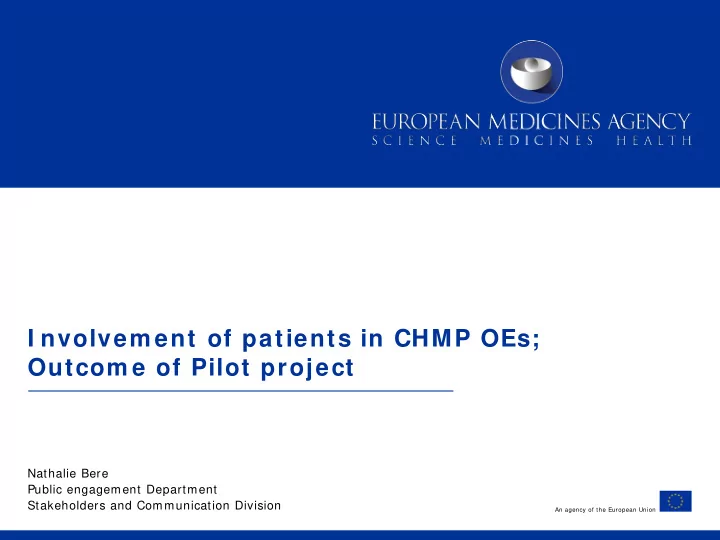

I nvolvem ent of patients in CHMP OEs; Outcom e of Pilot project Nathalie Bere Public engagement Department Stakeholders and Communication Division An agency of the European Union
Rationale for the pilot: • The added value of including patients’ perspectives within EMA benefit/ risk considerations has been demonstrated many times; • Patients already involved in benefit-risk evaluations within SAG/ ad-hoc expert group meetings, other committee consultations & scientific advice procedures; • It was felt this could be expanded further within CHMP and provide additional opportunities for patient input; • In line with CHMP work programme and the Agency’s overall emphasis on stakeholder engagement; • Building on this, a pilot proposed whereby patients invited to participate in B/ R discussions at CHMP during specific OEs
Pilot m ethodology: • Patients invited to participate where their involvement anticipated to bring added value to the discussion; case-by case basis • Patients (or carers) selected depending on relevance of their experience/ knowledge of particular disease/ condition under evaluation; and after assessment of any COI • Two patients invited, accompanied by a ‘mentor’ (PCWP member); in addition EMA provides personal support (guidance on the work of the EMA/ CHMP, the issues for discussion & clear definition of their role) • Patients give their views and participate in the discussions; including asking questions to the company; they do not take part in decision-making process (leave the room prior to voting).
Pilot duration: Sept 2 0 1 4 – Nov 2 0 1 6 1. Sept 2014 - Scenesse (afamelanotide) – treatment of erythropoietic protoporphyria (EPP) 2. Jun 2015 - I ntuniv (guanfacine) – treatment of ADHD in children & adolescents 3. Oct 2015 - Tecfidera (dimethyl fumarate) – treatment of multiple sclerosis (Referral procedure related to risk management of PML) 4. May 2016 - Kyndrisa (drisapersen) - treatment of Duchenne muscular dystrophy 5. Jun 2016 - Translarna (ataluren) - treatment of Duchenne muscular dystrophy 6. Nov 2016 - Translarna (ataluren) - treatment of Duchenne muscular dystrophy
Feedback After each case, questionnaires were sent to: CHMP working group Relevant rapporteurs EMA product leaders (EPLs) Patients / carers who participated Total of 36 responses received (22 CHMP/ EMA, 14 Patients/ carers)
Cum ulative responses from CHMP & EPLs 5
6
7
8
9
Cum ulative responses from Patients / carers 10
11
12
13
Conclusions from pilot • Feedback from CHMP/ EMA received during pilot is generally positive • Patients report a very positive experience; increases transparency and trust in the work of the CHMP • Each case is variable depending on the topic and on patients involved • Involvement has been a learning curve and has improved with experience • More relevant questions for the patients; focused on the assessment • Everyone involved knows better what to expect
Proposed w ay forw ard • Continue to invite patients to oral explanations on a case-by-case basis (when input could be valuable to the assessment); • In addition use alternative methods to consult patients more regularly; Participate in CHMP discussion by TC; respond to specific pre-defined questions, not necessarily limited to OE Written consultation; anytime during evaluation; allows for consultation outside of plenary meetings & usually includes feedback from larger number of patients Elicitation of patient preferences (MCDA methodology currently under investigation)
Thank you - Questions? Nathalie Bere Patient relations coordinator Public Engagem ent Departm ent nathalie.bere@em a.europa.eu Telephone + 44 (0)20 3660 8452 16
Recommend
More recommend